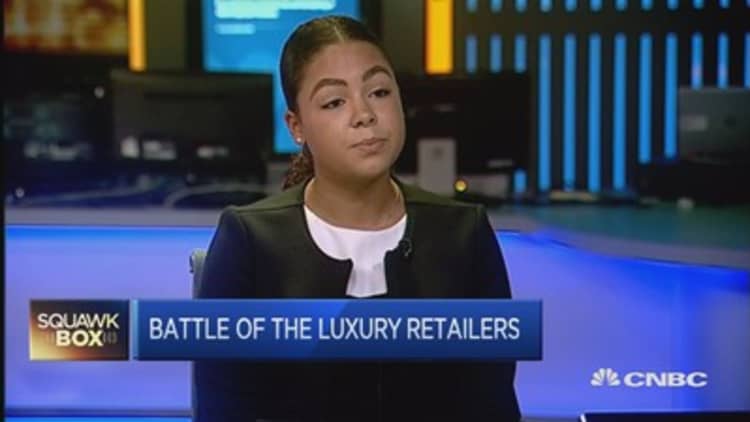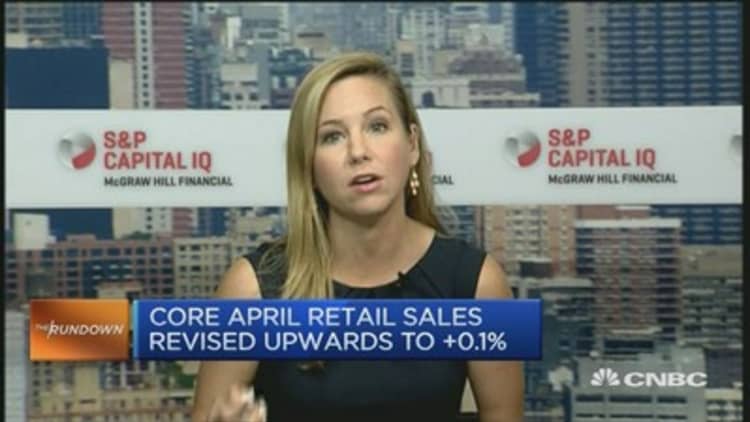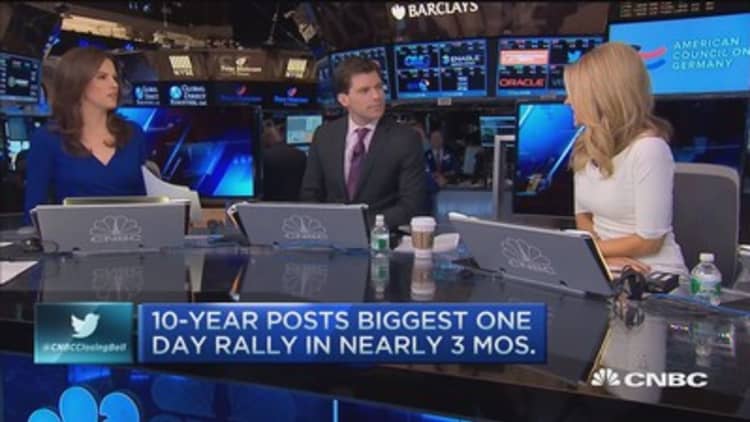The middle class is back, and some analysts say it's time to dip into the retail stocks that could benefit the most.
May's robust retail sales was an affirmation of an improving consumer, and with the job market strong, the trend is expected to continue.
"As people start to step up in quality from the dollar store and Wal-Mart," there's potential for Target and Macy's, said TD Ameritrade's chief strategist, JJ Kinahan.



Target is among the top overweight holdings of large-cap value funds, while hedge funds increased short interest in Wal-Mart and Marriott International, a Goldman Sachs report on first-quarter holdings showed.
"In the discretionary space, not all retailers are created equal," said Robert Pavlik, chief market strategist at Boston Private Wealth. He likes Home Depot and Starbucks as strong brand names in the middle of the income range as "both ends of the spectrum have been negatively impacted."
Luxury retailers have suffered from the strength of the dollar, with S&P's global luxury index lagging both the S&P 500 and consumer discretionary sector. On the other hand, the low end hasn't met expectations for sales increases.
Overall, both hedge funds and mutual funds favor consumer discretionary, with the sector receiving the third-largest increase in overweight positioning among large-cap core mutual funds, Goldman Sachs analyst Alexander Loukedis said in the Wednesday report.
The middle-class consumer is also stepping up expectations for eating out, where preferences are for "fast-casual" chains such as Chipotle and for companies that recently held IPOs such as Shake Shack and Wingstop.
Read MoreFood for thought: Investors love restaurant stocks
Improved spending has "some upside to the fast casual because that's one of the first places where people start treating themselves when their income goes up," Kinahan said.
In that category, Raymond James' chief investment strategist, Jeffrey Saut, likes burger chain Red Robin, a notch higher in quality from the struggling McDonald's.
Greater consumer spending could help Chipotle's stock, which took a beating after missing high expectations for same-store sales growth.
Read More
The burrito maker, Starbucks, Nike, CVS and Costco top large-cap growth funds' most overweight holdings when compared with the Russell 1000 growth index, the Goldman report said.
To be sure, analysts emphasized that a stock-picking mentality is key for consumer discretionary, a sector that is the second-best performer in the S&P 500 so far this year.
"Retail sales acceleration will be needed throughout the remainder of the year to support strong earnings growth," said Lindsey Bell of S&P Capital IQ. "Expectations clearly remain quite high for the sector, thus we believe investments in the sector should be considered on a specific stock-by-stock and subindustry basis."
Manning & Napier, which has $45 billion of assets under management, has a strong weighting on media content creators. Key holdings include 21st Century Fox, Time Warner and Discovery.
"One area that consumers have been very willing to spend on is media content," said Greg Woodard, a portfolio strategist at the firm. "It's a very concentrated industry (with few players). There's an increasing means to distribute them."
The media sector is up 3 percent year to date, about half of consumer discretionary's overall gains.
"There's a whole host of consumer discretionary names we have to sift through and find the names that (will) reverse," said Marc Chaikin, CEO of Chaikin Analytics. He is also "looking for stocks that are experiencing improvement on underlying fundamentals."
He's seen strength in footwear and is watching Nike, in focus this week for its recently announced . The "Just do it" brand will be the first NBA apparel partner to have its logo on team uniforms.
The partnership could generate more than $1 billion a year in revenue, Stifel's Jim Duffy said. The firm has a "buy" rating on Nike and sees an upside of about 6 percent on the stock, which has outperformed the S&P 500 by 2 percent so far this year.
Second-quarter data so far signal consumer spending is on the rise after a weak first quarter.
Retail sales for May showed an increase of 1.2 percent from the previous month, with an upward revision for April's initial flat read. May's core figure (ex-autos, gasoline, building materials and food services) that is a component of gross domestic product growth increased 0.7 percent.
In an even more recent indicator for spending, Michigan's preliminary consumer sentiment survey for June beat expectations and showed a rise from May's 90.7 read.
Continued strength in the labor market supports more middle-class spending. U.S. personal income rose 0.4 percent in April, while wage growth beat expectations in May's jobs report.
Analysts expected consumers, especially on the low end, to spend more with the benefit of lower oil prices. Until recently, most data indicated a buildup in savings rather than a spending boost to the moderate economic recovery.
Read More
"They're starting to take on a little debt again which is a huge mindset change," said Saut. "I'm real optimistic on the American consumer."
He recommends Jarden with a "strong buy" rating and a price target of $63 a share, for nearly 19 percent upside. The company owns more than 100 brands such as Quickie, Yankee Candle and Mr. Coffee.


